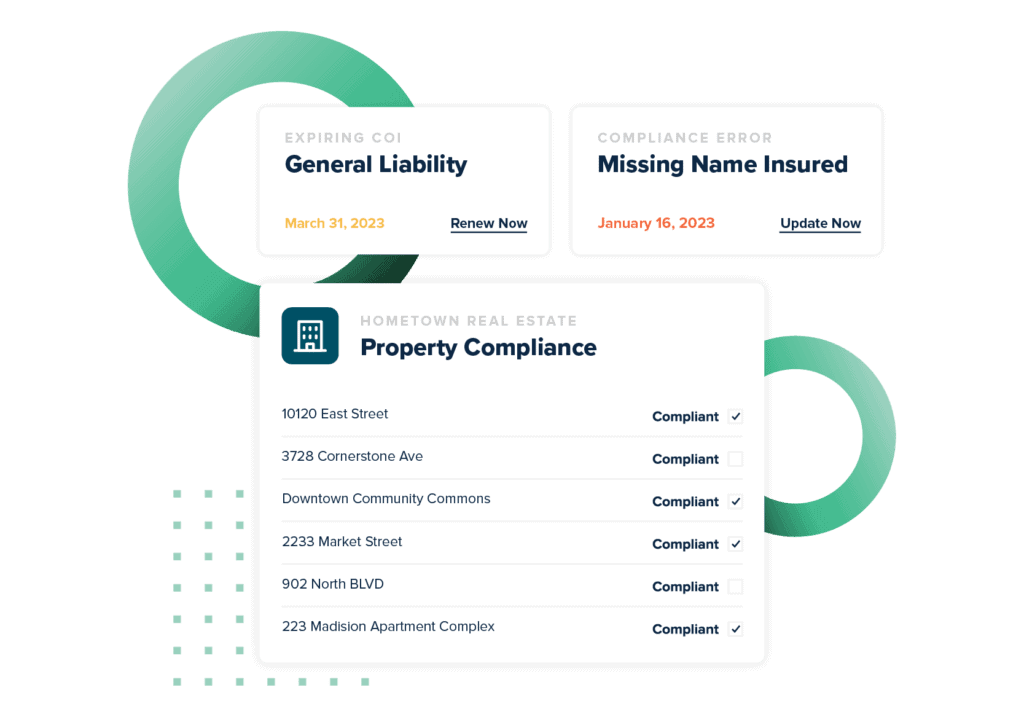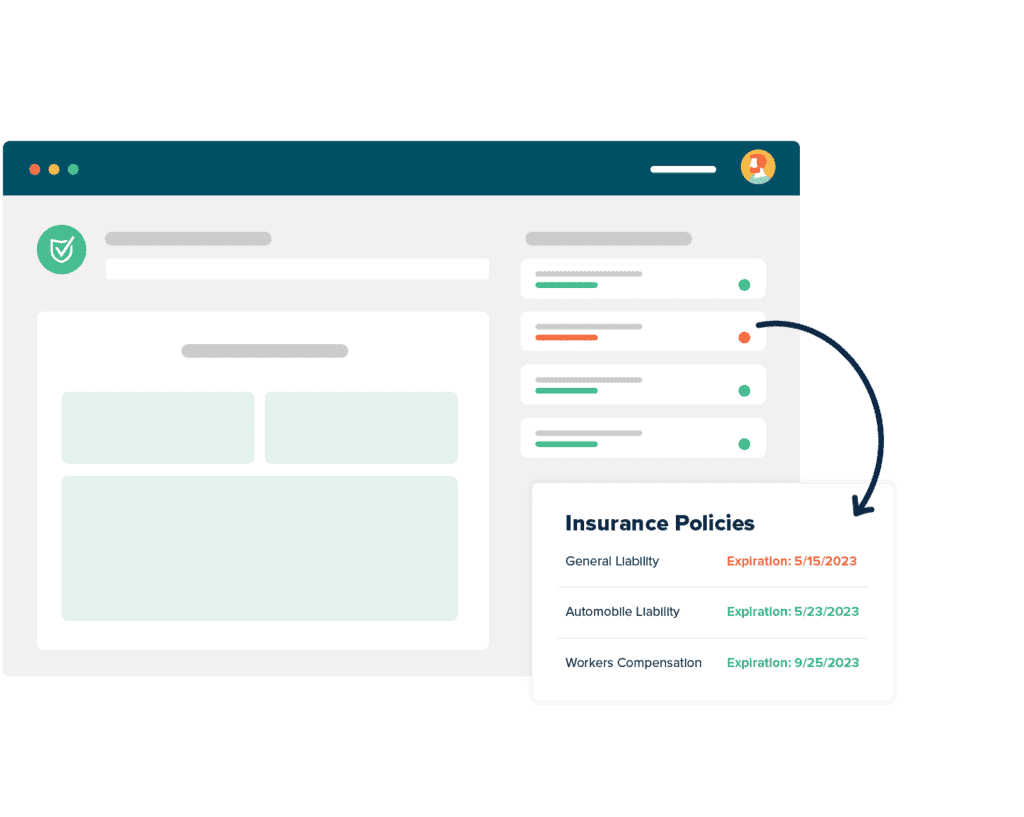Best Certificate of Insurance Tracking Software

Protect Your Business From Costly Claims
Ask your CFO or Risk Manager just how much claims and lawsuits can cost your business. If you are collecting certificates just to confirm they were received, you have no guarantee that your requirements are being met. myCOI Central is built on a foundation of insurance industry logic to ensure you remain protected with the appropriate coverage.
Automate Your COI Tracking
There’s no more need to worry about stacks of certificates cluttering up your office or hours of frustrating phone calls and emails to chase down certificates. myCOI Central provides your company with a solution to automate your insurance certificate requests, collection, and compliance resolution, while also giving your team a single, centralized repository to view compliance.


For Agents & Brokers
Win business and boost retention by providing agency branded, industry leading insurance tracking software to your insureds. Offer software only or add on your own compliance review services.
What Are The Benefits of COI Software?
View all CasesInsurance Certificate Compliance Tools
Any tool that can make the necessary and tedious work of verifying certificates of insurance is usually a wise investment for your risk management team. This goes triple for companies like general contracting firms, who hire and employ sometimes hundreds or thousands of subcontractors at the same time, sometimes with different certificate requirements for each job site.
Having a solid set of certificates of insurance best practices, whether you track each certificate of insurance online or not, is a solid tool in your insurance risk management arsenal.
Let’s look at what may inform those best practices.
What Is Insurance Tracking
When it comes to needing a certificate of insurance for business purposes, much depends on which business you are in that relationship. Let’s first look at when you’re the requesting business: you’re hiring contractors or vendors and you need to ensure they’re carrying the requisite coverage to shield your company from risk they create, without exclusions or limitations that your business won’t accept.
It almost goes without saying that you’re also on the lookout for fake business insurance certificates or other attempts at fraud.
In this instance, you probably have either a tool like myCOI to help you with this, or you have a risk management checklist of some sort to check the certificates of insurance against. One common check is to decide whether your company needs to be just the insurance certificate holder vs additional insured; being endorsed as additional insured can extend coverage to your organization in the event of a loss or litigation caused by the third party you hire.
And if you’re on the other side, the contractor or vendor providing the certificate of insurance, all you really need to do is consult with your broker or other insurer, ensure you meet and can accept all the coverage requirements requested, and get an acceptable certificate of insurance issued by your broker.
Certificate Of Insurance Compliance
Knowing how to organize certificates of insurance for tracking is a necessity for any company that hires third parties such as contractors or vendors. A certificate of insurance tracking solution allows businesses to track certificate of insurance compliance. It’s more than an expiration date tracker. And it’s a complicated practice that requires more nuance than “I have a stack of certificates now what?”
One of the most common mistakes that businesses make is not keeping accurate records of certificates of insurance. This puts them at risk for fines and penalties if they do not have up-to-date documentation on hand when requested by a third party, such as an attorney, sometimes even when they think they’re in compliance because they don’t check certificate of insurance requirements by state, which vary. In addition to having legal consequences, failing to keep track of your company’s certificates could lead to financial losses. It also increases the likelihood of liability lawsuits filed against your business. Knowing who needs to provide a certificate of insurance is one of the core components of risk management.
It’s not just those who hire contractors and vendors that need to track certificates of insurance. Property managers who host commercial tenants also need to ensure those tenants are carrying the proper insurance. We often see the duty of securing and verifying these COIs fall on property managers, instead of dedicated risk teams, so we strongly suggest having on hand a sample letter requesting certificate of insurance from commercial tenants, so you can quickly request the COIs you need to manage your property’s risk.
Remember. If you find yourself asking which vendors need a certificate of insurance, the answer is usually “all of them.” The next step, knowing how to request a certificate of insurance from a vendor, is something your risk management team probably already has a process for.
Best Certificate Of Insurance Tracking Software
The decision to choose the best certificate of insurance management software is a complicated one, and we’d be being dishonest if we didn’t say you need to choose the right solution for your company. Obviously, at myCOI we believe we are the right solution nine times out of ten, but we don’t fit every company, and that’s okay. Certificate tracking online could be a critical part of your business no matter what solution you use, whether that’s a fully managed partner solution, myCOI competitors, or something else.
You’ll need to define what “best” means for your business. Is it the least expensive? That depends on how you measure cost. In pure dollars, a free certificate of insurance tracking software may work, but is it reliable? Does its developers offer support? Are there regular product updates coming out? If not, check it carefully to make sure it isn’t out of date.
Is “best” the least of your precious person-hours consumed by tracking certificates of insurance? Then a managed solution like myCOI offers may be best. Our team of insurance professionals know what they’re looking at, and they’re experts in making sure your certificates are promising what they say they do, that they meet your business requirements for coverage, and our quarterly verification makes sure the coverage stays in effect.
Certificate Of Insurance Tracking Template Excel
If you’re looking for a simple and manual way to track the certificates of insurance in your business, then finding a COI tracking spreadsheet template is an option worth considering. Many companies begin by having their staff track insurance policies on Excel spreadsheets. And for smaller companies just starting out, that system works. For basic certificate of insurance tracking spreadsheets are not a bad solution, certainly better than just a basic expiration date tracker.
Many companies find spreadsheets a good training tool; for a certificate of insurance tracking template Excel has several basic templates that can be customized to what you need, but most companies scale past this very quickly.
The drawbacks of using an Excel insurance tracker are that they can be time-consuming to maintain and often require constant updating. What began as a simple project one person could track and easily snowball into a time-intensive process that’s impossible to scale as a company grows. Instead, companies might add more people and more spreadsheets, which leads to paperwork being lost or misplaced, which leads to increased chances for errors in the data.
That is exactly the worry that myCOI erases. Our systems are industry-leading. Our insurance professionals are top-notch. If you’re tracking hundreds of certificates of insurance, we’d love the chance to show you just how much time and effort we can save you.
What Does A Certificate Of Insurance Look Like
As you are looking at your ACORD certificate of insurance sample, and then double-checking your own actual certificate, it is important to make sure there are no mistakes. If you’re providing this certificate to a hiring entity, they’re going to verify your coverage. If there are discrepancies, that could slow down when you begin work or even delay the project.
Think of it this way: in many states, you’re required to carry a certificate of car insurance sample—well, not a sample, the little card your car insurance agent gives you is the actual certificate—in case you get pulled over, to prove you’re covered in case of an accident. Companies have to do the same check, except the insurance requirements for businesses when dealing with other businesses are far more complex.
If you’re learning how to read certificates of insurance, a sample ACORD 25 is a good place to start. It is the most common general liability certificate of insurance form. ACORD insurance forms are well-trusted in the insurance industry.
On the ACORD 25 sample, there are a few common mistakes people make. One of the most common mistakes is getting policy numbers confused. Your auto, workers’ compensation, and general liability insurance policies may have different policy numbers. Make sure you pair the right policy number with the right type of insurance.
Furthermore, these policies may have different expiration dates. Do not assume they all have the same effective date and expiration date. If you do, you may end up assigning the wrong dates to the wrong policies. This will render your ACORD 25 form inaccurate. Double-check the policy effective dates and expiration dates before you provide the certificate to anyone. If you have questions about your insurance policies, reach out to your insurance provider for more.
When Do You Need A Certificate Of Insurance From A Vendor
If you’re a contractor or business asking “when do you need a certificate of insurance from a vendor?” The answer is pretty simple: before any vendor that enters your business premises or project site to perform work and takes any actions that may generate any risk at all needs to give you a certificate of insurance. Many companies maintain sample insurance requirements for vendors in a file for easy access.
That sounds pretty vague, we know, but it’s a simple reality. Risk exists all around us, whether we generate it or not, and the last thing you want to do is assume the burden of risk your vendor opened you to because you failed to secure a certificate of insurance.
Now you may ask “what is a certificate of insurance for vendors?” and the answer is, the same thing you provide to other entities that you do work on behalf of. It should show the vendor’s coverage, any limitations or exclusions, and all the usual information. You should request certificates of insurance from vendors every time you hire them.
Knowing how to request a certificate of insurance from a vendor likely comes down to how your business works with vendors. In many cases, COIs with the minimum insurance requirements for vendors are required as part of the vendor application process or were specified in the RFP, or in an agreement or contract. If not, it’s often a requirement before the vendor can begin working.
If you deal with a lot of vendors, you can often save a lot of time by having a sample letter requesting proof of insurance from vendors on hand. Knowing how to request a certificate of insurance from a vendor does little to shield you from the hours of work you have ahead of you verifying all those resultant COIs, though. A request for certificate of insurance sample letter can also be a useful training aid.






